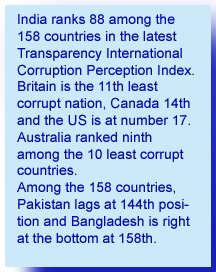 India has improved its rankings in the global corruption perception index. It ranks 88 among the 158 countries in the latest Transparency International Corruption Perception Index and there is undoubtedly great room for improvement.
India has improved its rankings in the global corruption perception index. It ranks 88 among the 158 countries in the latest Transparency International Corruption Perception Index and there is undoubtedly great room for improvement. In comparison, Britain is the 11th least corrupt nation, Canada 14th and the US is at number 17. Australia ranked ninth among the 10 least corrupt countries.
Among the 158 countries, Pakistan lags at 144th position and Bangladesh is right at the bottom at 158th.
Balbir S. Sihag, a professor of economics at the University of Massachusetts who visits India twice a year, says that high economic growth, as is the case of India and China today, was prevalent with high corruption in Britain and the US before these countries emerged as major economic powers.
Both Britain and the US had very high degrees of corruption during the Industrial Revolution. Even today corruption - like the Enron and other corporate scandals - are very much evident.
‘In the West, they amend laws. In developing countries, they bend laws,’ says Sihag, citing million-dollar budgets and slush funds of lobby groups while in the poor countries it is plain corruption.
The Transparency International (TI) corruption perception index, for all its good intention, is a difficult beast to wholeheartedly adopt. It is, after all, merely a guide to perceptions of corruption, and does not measure corruption itself.
India is a regular source of corruption stories for NewsHound. In fact the whole of that region is rife with petty bribery, often referred to as tea money.
Professor Sihag raises the key issue, however. It is only corruption if it is proscribed by law, and it seems, viewed by voters as being an ethical violation.
It is an easy thing to change laws to legitimize questionable behavior; not only easy, but common, in many of the Western Democracies. The ability to sanitize unethical acts by rebadging and enshrining them in law them can be seen in a wide range of areas of public interest, from electoral law through to allowing perks for low level and low paid public servants.
Of greater concern is the ability of governments and their public sectors to ignore the law and rely on public opinion to cover their transgressions.
That can be seen at play in the US where voters are willing to overlook the Bush administration’s unlawful use of torture, rather than accept the awful reality of what is really happening. That is just one area where that particular administration is riding rough shod over the community.
In Australia, the Oil for Food scandal has exposed the Howard Government’s willingness to break laws in the name of international trade. For a while it seemed that voters in that country might overlook what was seen as a ‘necessary’ method of doing business.
Blair’s government in Britain received a rude shock when voters rebelled at the sale of honours to raise party election fighting funds.
Of course those three leaders got away clean from an even greater level of unethical behavior – prosecuting a war on what were clearly lies. But that sort of issue is a little beyond the understanding of the ordinary folk, it would seem.
The perception index really does face some difficulties. Canada comes in below Australia, at 14th position. Why? It is certainly not because the country is more prone to corruption than its Commonwealth sister.
My theory, and experience for that matter, is that Canadians are generally, genuinely decent folk who really take news of official corruption to heart. They don’t yell and scream about it, they are simply not that confronting, but they feel it.
Not like my Australian mob. So often, when I quizzed family and others about corruption in that country there is something close to relief, in finding government and public servants can be crooked. “Well if they can do it, its okay if I do it,” one explained to me.
With that attitude I’m only surprised that Australia does not appear as number one on the list, a country where corruption is happily perceived as business as usual.

No comments:
Post a Comment